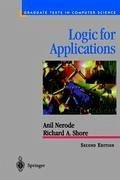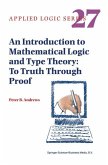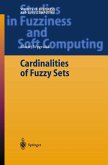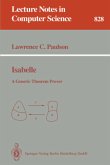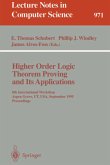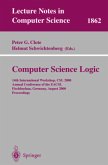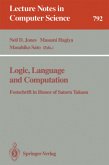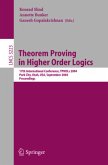This textbook provides a first introduction to mathematical logic which is closely attuned to the applications of logic in computer science. In it the authors emphasize the notion that deduction is a form of computation. Whilst all the traditional subjects of logic are covered thoroughly: syntax, semantics, completeness, and compactness; much of the book deals with less traditional topics such as resolution theorem proving, logic programming and non-classical logics - modal and intuitionistic - which are becoming increasingly important in computer science. No previous exposure to logic is assumed and so this will be suitable for upper level undergraduates or beginning graduate students in computer science or mathematics.From reviews of the first edition: "... must surely rank as one of the most fruitful textbooks introduced into computer science ... We strongly suggest it as a textbook ..." SIGACT News
Hinweis: Dieser Artikel kann nur an eine deutsche Lieferadresse ausgeliefert werden.
Hinweis: Dieser Artikel kann nur an eine deutsche Lieferadresse ausgeliefert werden.
From reviews of the first edition:
"... must surely rank as one of the most fruitful textbooks introduced into computer science ... We strongly suggest it as a textbook ..." SIGACT News
From the reviews of the second edition:
"...the book achieves its goal of being a unified introduction into classical logic, logic programming and certain non-classical logics. ...the book succeeded in presenting a uniform framework for describing different logics. The author's thorough approach to describing logic programming, via introduction of resolution-based refutations and subsequent study of different kinds of resolutions allows the reader to gradually switch from the study of logic to the study of logical programming paradigm and provides a lot of intuition about the behavior of logic programs. As such the book can be recommended both as a textbook for senior/graduate course in logic/logic programming, and as a reading or reference for graduate students in the areas related to discrete mathematics." -- (Alexander Dekhtyar, William Gasarch's Book Review Column, SIGACT News)
"... must surely rank as one of the most fruitful textbooks introduced into computer science ... We strongly suggest it as a textbook ..." SIGACT News
From the reviews of the second edition:
"...the book achieves its goal of being a unified introduction into classical logic, logic programming and certain non-classical logics. ...the book succeeded in presenting a uniform framework for describing different logics. The author's thorough approach to describing logic programming, via introduction of resolution-based refutations and subsequent study of different kinds of resolutions allows the reader to gradually switch from the study of logic to the study of logical programming paradigm and provides a lot of intuition about the behavior of logic programs. As such the book can be recommended both as a textbook for senior/graduate course in logic/logic programming, and as a reading or reference for graduate students in the areas related to discrete mathematics." -- (Alexander Dekhtyar, William Gasarch's Book Review Column, SIGACT News)

